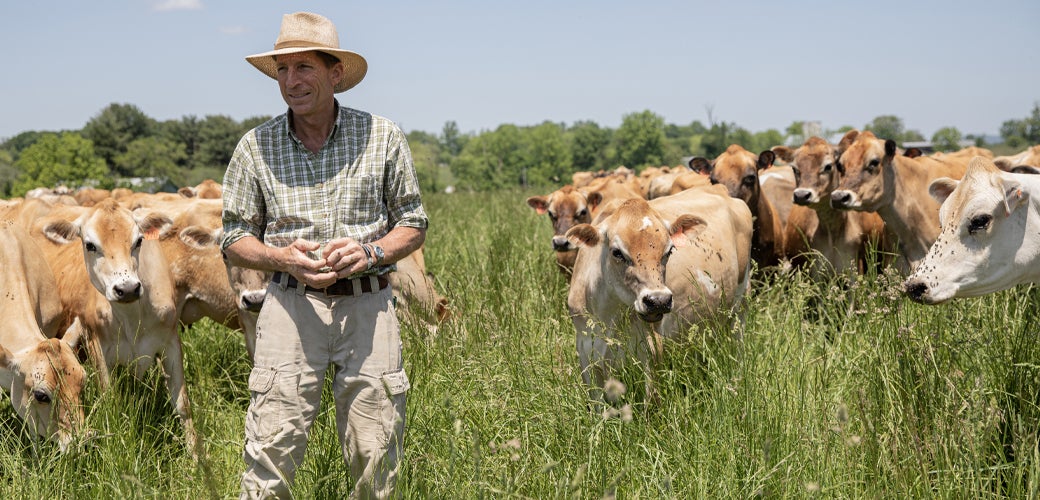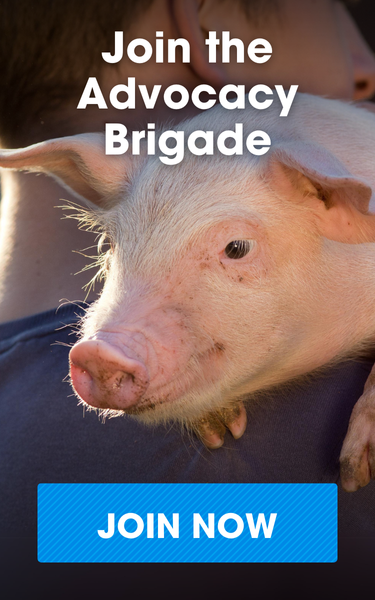
Matt’s Blog: The Farm Bill Will Determine the Future for Farmers and Billions of Animals

By ASPCA President & CEO Matt Bershadker
About an hour outside D.C., where Congressional lawmakers and their staffs are debating measures in the massive Farm Bill that shapes our food system, farmers in the field are modeling what a better future could look like.
I recently spent the day with higher-welfare, pasture-based farmers at Georges Mill Farm, Open Book Farm, and Holterholm Farms to better understand their vision for our food system and how their practices enable them to be both more humane and economically viable. Despite working within a food system not designed to support them or their success, these farmers show how higher-welfare farming is not only kinder to animals, better for the environment, and better for farm workers, but that it can also be profitable—an outcome that would serve all Americans better than the status quo.
While my perspective on this issue is chiefly influenced by my concern for animals, seeing these farmers as agricultural experts commit themselves to their roles in building a more sustainable farming future made a strong impression on me and deepened my understanding of the opportunity before us.
The farms I visited collectively raise dairy goats, pigs, egg-laying hens, chickens, turkeys, beef cattle, and dairy cows. As I crouched down to observe a content Berkshire pig out on pasture at Open Book Farm, I couldn’t help but think of the millions of pigs and other animals whose lives are a stark contrast to this scene.
On industrial, confinement-based farms, pigs never feel sunshine on their backs or a cool breeze. As the farmers noted, these are highly intelligent animals, but in those facilities, they are kept in cages or crates or crowded in concrete sheds. The animals are packed together so tightly that within a few months, there’s barely room to move in their pens. Mother pigs used for breeding are immobilized in small “gestation crates” where they can’t even turn around.
This does not have to be the reality of our food system. Our antiquated federal policies and programs have propped up these industrial confinement systems, swayed by the outsized lobbying power of a small number of large companies. But these farmers prove that our system could be more humane and sustainable, as well as economically viable.
As we walked among the animals enjoying their day on pasture, we saw how access to space, fresh air, sunlight, and diverse vegetation keeps them healthy. In this natural setting, there’s no need for routine antibiotic use or animal mutilations like cutting off tails or beaks—common practices in stressful, crowded, confinement-based operations to prevent illness or injury. Raising animals on well-managed pastures in this way can also reduce water demand, improve soil health, and even mitigate climate impacts—standing again in sharp contrast to the steep environmental consequences of industrial farming.
The folks at Holterholm Farms—previously a conventional dairy operation—explained how transitioning to a pasture-based model, in addition to giving their dairy cows a better quality of life, also improved their economic stability and overall quality of life.
The farmers demonstrated their resilience in their response to the COVID-19 pandemic, describing how they continued to feed their communities and actually expanded their businesses while industrial agriculture’s fragile supply chains broke down and left grocery store shelves empty.
Public sentiment is on the side of these farmers, with surveys showing that most Americans are concerned about how industrial animal agriculture negatively affects animal welfare and would likely switch to products from farms using higher animal welfare practices. As public concern about industrial animal agriculture grows, our nation is at a crossroads. We can continue to fuel an often cruel and harmful status quo, or we can build a safer, more secure food system that isn’t costing us our environment, our health, and the wellbeing of animals and farmers alike.
This year’s Farm Bill offers a commonsense opportunity to level the playing field for independent farmers across the country who are using responsible practices. Some members of Congress have already proposed critical reforms to include in the Bill that would help interested farmers transition from industrial models to more humane practices, support existing higher-welfare farmers as they work to increase their capacity and meet growing demand, and hold industrial agriculture companies accountable for harms caused to farmers, workers, animals, and the environment.
Seeing so many different farm animals expressing the natural behaviors they were meant to enjoy and treated with respect left me with an enduring image of the better world we can build for farm animals, farmers, and their families, with effects that ripple outward into our communities. Congress should ensure that the provisions of the Farm Bill embrace this more humane and resilient future for us all.
Please help advance these measures by asking your representatives to support them and sharing this better way forward with your family and friends. If you’re a farmer interested in connecting with lawmakers to share your story, please reach out to us at [email protected].

